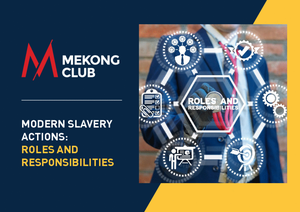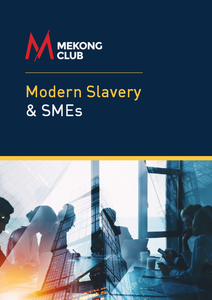Have you taken action to address forms of modern slavery within your supply chains?
By Juliette Tafreschi, September 26, 2023
Addressing modern slavery in your supply chains is both an ethical imperative and a strategic necessity. The Mekong Club offers companies a compelling reason to take action. A conversation with Clemence Aron, Programme Director, Mekong Club.
What is The Mekong Club, and what is its primary mission?
The Mekong Club is a nonprofit organisation based in Hong Kong that works with the private sector to bring about sustainable practices against modern slavery across the globe. As a member-ship based organisations, companies can join and enjoy a range of benefits, anti-slavery tools, resource, and consultations. We have created a community of like-minded peers across different industries, working together to address modern slavery. Through these efforts, our mission is to inspire and engage the private sector to work together towards creating a slave-free world.
How does The Mekong Club engage with the private sector to address modern slavery?
When partnering with us, companies undergo a baseline assessment. This assessment yields a comprehensive report, offering insights into their current anti-slavery efforts and pinpointing areas for improvement. This strategic roadmap empowers organisations with the confidence and guidance necessary to address various forms of modern slavery within their supply chains. Additionally, we offer a range of resources, including companywide training session, consultations, policy reviews, industry-specific working groups, and a suite of online tools and resources, tailored to the unique needs of our business community.
What motivated the establishment of The Mekong Club?
Thirty years ago, Matt Friedman, CEO and founder of the Mekong Club, worked as a senior USAID public health official across Asia, focused on education and prevention of HIV/AIDS in small rural communities. As part of Matt’s work, he visited many shelters where he repeatedly heard the same themes of horror. His first interview was a fifteen-year-old girl telling him she was sexually abused over seven thousand times. She did this for two years until she was forced to leave because she suffered from various diseases that turned customers away. Matt soon realized that, just as this young girl had been exploited for sex, millions more were being exploited across the world. This exploitation was happening in the sex industry but also permeates global supply chains, from factories to farm to fishing boats.
Matt began to work in the United Nations in the anti-trafficking world, where he worked closed with the public and private sectors across Asia. During his tenure, he noticed a gap in engagement with the private sector in their anti-trafficking efforts. Not because they didn’t want to, but because they feared being named or shamed for approaching a UN official to ask for help.
As a result, Matt left the United Nations and started The Mekong Club in Asia’s financial centre, Hong Kong to provide a safe space for companies worldwide to work together to help identify and eliminate forced labour in the private sector.
What industries and types of companies are part of The Mekong Club's membership?
The Mekong Club is a place for any size company, industry or working professional to learn and encompass new ideas to advance new methods on addressing modern slavery. Our business association members includes brands and companies from a range of industries, from financial services, to hospitality, retailing and manufacturing, amongst others.
What values guide The Mekong Club's approach?
Our Just Cause is the core driver to our values. We imagine a slave-free world whereby businesses collectively redefine how to approach social sustainability. Whereby working professional wake up every morning feeling inspired and fulfilled by their working, knowing that the children, men, and women who have fallen victim to the actions of criminals, can return home safely to their families. We believe the best way to build this world is to commit to making it together.
Our Core Values Include:
- Collaboration for the betterment: Tackling the issue at hand with businesses serious about making a difference.
- Innovate to regenerate: Continuously share ideas and encourage others to do the same. We share in each other’s successes and failures to better the world around us.
- Equip for action: engage in the proactive pursuit to empower and inspire with the resources to act and make a difference.
- Adopt an unconventional approach: Embrace news ways of doing that leave long-lasting impacts on the future, not just short-term fixes.
What types of resources does The Mekong Club provide to support suppliers?
The supplier portal is now available. The first series of tools released is aimed to help suppliers meet buyers' requirements. The first tool, the Forced Labour Indicators Guide, presents ILO indicators, examples, and sub-indicators to identify forced labor risks in operations and supply chains. The second tool, Transparency Legislation Guide for Suppliers, offers a concise overview of how anti-slavery/HRDD legislation impacts businesses in global supply chains. Lastly, the Self-assessment Questionnaire Template assists suppliers in a structured assessment process, facilitating the identification of forced labor risks and collecting essential data for social audits and other assessments.
How did you come up with the idea of the supplier portal?
The Mekong Club has been extensively working with brands and retailers to shape HRDD/ anti-slavery policies. The way forward was to create tools to enable suppliers to effectively take part in these initiatives. There is an urgent need for brands and retailers to build trust, enhance communication and provide support to their suppliers. We decided to create a platform for suppliers, offering user-friendly tools available in multiple languages. These tools empower factory managers to identify, and address forced labour risks within their facilities and supply chains.
How does The Mekong Club foster collaboration among its members?
We unite a diverse array of stakeholders, including businesses, NGOs, governments, and academia, fostering a collaborative environment that thrives on varies perspectives. By engaging this diverse community, we promote open dialogue and cooperation. We’ve established a trusted working groups dedicated to specific industries and supply chain issues, providing professionals with a platform to share insights and collaborate on solutions, Encouraging our members to exchange information and best practices facilitates the flow of knowledge, research findings, and case studies, enriching collective learning.
Our commitment to collaboration extends to hosting specialized conferences, workshops, and seminars that convene our members. These events facilitate discussion on emerging issues, offer opportunities to share experiences, and foster valuable networking among participants.
Clemence is responsible for developing practical tools and solutions for companies to address modern slavery in their operations and supply chains. Her focus has been on empowering businesses to drive sustainable change and advance human rights. Prior to the Mekong Club, she worked as a consultant at the International Labour Organization (ILO) and in the private sector. Clemence is experienced in managing cross-functional projects involving a diverse range of stakeholders such as private companies, NGOs, chambers of commerce, governments, and international organisations.

Check out Mekong Club’s Supplier Web Portal
Your gateway to fostering responsible sourcing and combatting modern slavery.


